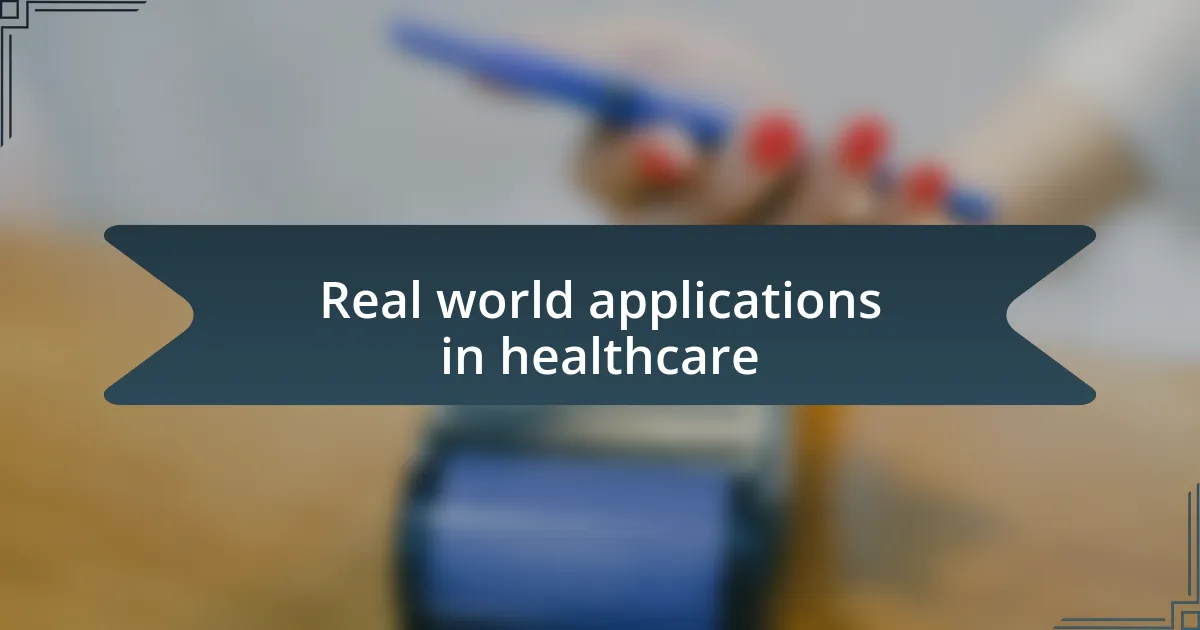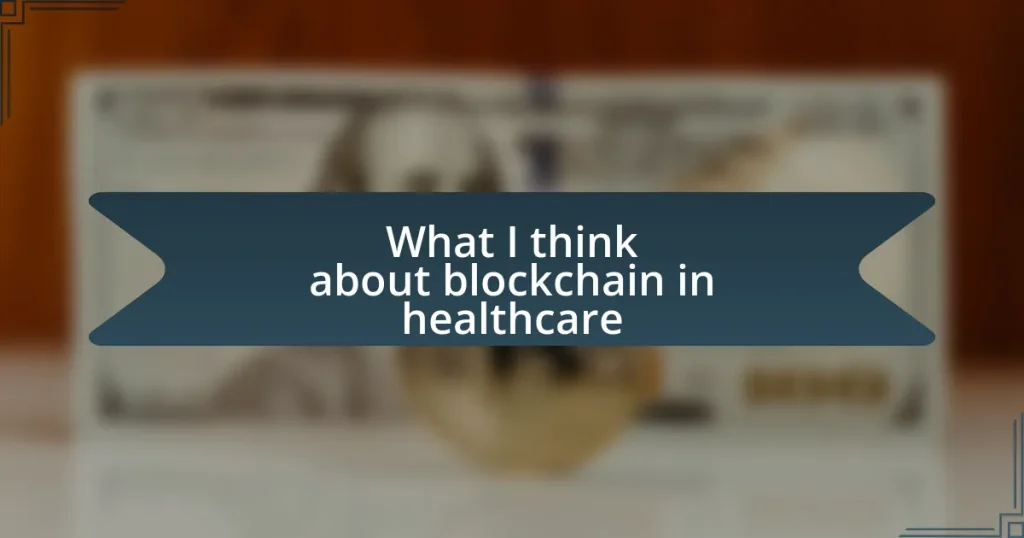Key takeaways:
- Blockchain technology offers security, transparency, and interoperability, potentially transforming patient care in healthcare.
- Key benefits include heightened data security, enabling seamless access to patient records, and fostering trust through transparency.
- Challenges include complex regulatory compliance, high initial costs, and the need for interoperability with existing systems.
- Successful implementations, like those in Estonia and Chronicled, showcase the potential of blockchain to improve data management and drug supply chain integrity.

Understanding blockchain technology
Blockchain technology is a decentralized digital ledger that records transactions across multiple computers, ensuring that the data is secure and tamper-proof. I remember the first time I learned about blockchain—my initial thought was, “How can something so complex be so revolutionary?” This technology eliminates the need for a central authority, which not only enhances security but also fosters transparency.
At its core, blockchain consists of a series of blocks that hold data and are linked in a chronological chain. I often think about how this can be applied in various industries, especially in healthcare, where data integrity is paramount. Can you imagine a world where patient records are easily accessible yet completely secure?
One fascinating aspect of blockchain is its inherent immutability; once data is recorded, it cannot be changed or deleted. This concept resonates deeply with me when considering the implications for medical records—no more alterations or lost information! I find myself wondering how this technology could transform patient care and trust between healthcare providers and patients.

Benefits of blockchain in healthcare
The benefits of blockchain in healthcare are substantial and transformative. For one, it promotes interoperability among different healthcare systems. I can recall a frustrating experience when trying to collect my health records from multiple providers. Those struggles could be alleviated with a unified system supported by blockchain, where all health records are accessible in one place—secure and streamlined.
Another key advantage is heightened data security. I often think about the anxiety many feel regarding sensitive health information being compromised. Blockchain’s decentralized nature offers a level of encryption that makes hacking nearly impossible, relieving much of that worry for patients and providers alike. The ability to trust that patient data remains untainted empowers both patients and healthcare providers to focus more on care rather than concerns about data breaches.
Lastly, blockchain enhances transparency between stakeholders. When I engage in discussions about healthcare, I see a consistent theme: patients crave understanding and clarity about their treatment. By allowing patients to track who accesses their data and when, blockchain nurtures trust. In my experience, this transparency could fundamentally change the patient-provider relationship for the better.
| Benefit | Description |
|---|---|
| Interoperability | Enables seamless access to patient records across different healthcare systems. |
| Data Security | Offers robust encryption, safeguarding sensitive health information from breaches. |
| Transparency | Allows patients to track access to their data, fostering trust between them and providers. |

Challenges of implementing blockchain
Implementing blockchain in healthcare isn’t without its hurdles. One major challenge I often think about is the regulatory landscape. Healthcare regulations can be incredibly complex, and when you layer in blockchain’s decentralized nature, it creates a murky environment where compliance becomes difficult. I’ve seen firsthand how frustrating it can be for organizations to navigate these regulations; it often feels like a maze where one misstep could lead to significant consequences.
Another significant obstacle is the initial cost of implementation. For many healthcare providers, the financial investment required to adopt blockchain technology can be daunting, especially when budgets are already tight. From my perspective, this concern was palpable during conversations with various stakeholders who voiced a desire to innovate but faced hefty upfront costs. Here are some key challenges that come to the forefront:
- Regulatory Compliance: Navigating complex healthcare regulations in conjunction with decentralized technology.
- High Initial Costs: Significant financial investments required to successfully implement blockchain solutions.
- Interoperability Issues: Challenges in ensuring that blockchain can seamlessly communicate with existing healthcare systems.
- Healthcare Workforce Readiness: The need for training and education to equip staff with the necessary skills to utilize blockchain effectively.
- Data Standardization: Difficulty in ensuring consistent data formats and protocols across diverse healthcare entities.

Real world applications in healthcare
When I think about real-world applications of blockchain in healthcare, one notable example is patient data management. Imagine a scenario where a patient’s medical records are securely stored on a blockchain. This not only gives patients more control over their data, but it also allows healthcare providers to easily share accurate information across platforms. In my experience, seamless access to real-time patient data can significantly improve treatment outcomes and reduce costly errors.
Another compelling application is drug supply chain management. With blockchain, each transaction can be recorded in a way that is immutable, providing a transparent view from manufacturer to pharmacy. This traceability helps combat counterfeit drugs, which is a persistent issue in the industry. I remember discussing this with a pharmacist who was deeply concerned about the implications of receiving compromised medications; the peace of mind that blockchain could bring to their practice was palpable in our conversation.
Moreover, blockchain’s role in clinical trials is transformative. The technology can streamline the recruitment process and ensure that data remains unalterable throughout the trial, fostering trust among participants. I think about how frustrating it can be for researchers to deal with data inconsistencies; blockchain can offer that much-needed reliability. In a field where data integrity is paramount, why wouldn’t we explore a solution that enhances transparency and fosters trust?

Future trends in healthcare blockchain
As I consider future trends in healthcare blockchain, one exciting development is the enhanced interoperability it promises. Imagine a world where various healthcare systems can communicate effortlessly, with blockchain serving as a universal translator. I’ve witnessed firsthand how frustrating it can be when systems are incompatible, leading to delays in treatment. Wouldn’t it be revolutionary if a patient’s health information could flow seamlessly wherever they go?
Another trend I see gaining traction is the incorporation of smart contracts in healthcare. These self-executing contracts could automate processes such as billing and insurance claims, reducing administrative burdens. I recall a conversation with a hospital administrator who lamented the time spent on paperwork. The prospect of smart contracts relieving that pressure feels like a breath of fresh air—and who doesn’t want to streamline their work process?
Additionally, I believe we’ll see an increase in patient-engaged health records through blockchain technology. With patients taking a more active role in their healthcare, they can not only access but also curate their data. From attending panel discussions, I’ve learned that many patients crave control over their medical information. Isn’t it empowering to think that individuals could manage their records in a way that enhances their treatment experience and fosters empowerment?

Case studies of blockchain success
When examining successful blockchain implementations in healthcare, the case of Estonia stands out to me. This small European nation has effectively integrated a blockchain-based system for managing health records, ensuring that medical information is not only secure but also accessible to patients and healthcare providers alike. I can’t help but admire how such a streamlined approach eliminates the risk of data breaches while empowering citizens with direct access to their health information.
Another compelling example is Chronicled, a platform that utilizes blockchain to enhance supply chain integrity in the pharmaceutical industry. By tracking medications in real-time, Chronicled has significantly reduced counterfeit drugs entering the market. I remember chatting with a pharmacist who expressed deep concern over counterfeit medications potentially jeopardizing patient safety. Knowing there’s technology that can mitigate such risks feels like a breakthrough for everyone involved.
Lastly, the collaboration between IBM Watson Health and the American Diabetes Association has led to innovative data sharing for diabetes research via blockchain technology. This partnership allows researchers to access a unified database of patient records, facilitating impactful studies that could change diabetes management. Reflecting on this, I can’t help but think about how much potential lies in shared data for improving patient outcomes; isn’t that the ultimate goal in healthcare?

Regulatory considerations for blockchain
When discussing regulatory considerations for blockchain in healthcare, one of the first things that comes to my mind is the necessity for compliance with existing data protection laws, such as HIPAA in the United States. As I’ve navigated the complexities of health regulations, it’s clear that any blockchain solution must prioritize patient privacy to meet these strict guidelines. How can we ensure the security of patient data while leveraging the transparency that blockchain offers? It’s a balancing act that requires careful planning.
Additionally, I often wonder about the role of regulatory bodies in overseeing blockchain projects. For instance, will they adapt current frameworks to accommodate this technology, or will new regulations need to be established? From my experience, adapting to change can be a slow process in the healthcare sector, but it’s crucial. I’d argue that a well-defined regulatory framework could foster innovation while keeping patient safety at the forefront, a sentiment echoed by many stakeholders I’ve interacted with.
Moreover, the interoperability of blockchain systems poses another regulatory challenge. Simply put, how do we ensure that various blockchain platforms communicate effectively? I’ve seen firsthand how a lack of standards can lead to fragmentation in the healthcare system. Addressing this issue will require collaboration among healthcare providers, regulators, and technology developers to create comprehensive guidelines that support innovation while protecting patient interests.











